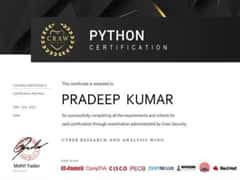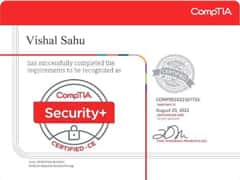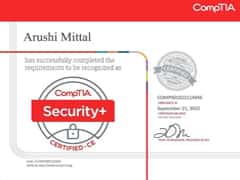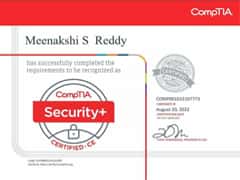Online Artificial Intelligence Course in Delhi
Bestseller
3571 Student Reviews
- Course Duration : 40 Hours
- Language : Hindi | English
- Course Delivery : Online | offline
Book a Trial Demo Class
Training Available 24*7 Call at 9513805401
Online Artificial Intelligence Course in Delhi
It Includes the power of Data Science, Machine Learning to create powerful Artificial Intelligence applications with the help of Artificial Intelligence training in Delhi.During the course, the students will also have the opportunity to participate in the organization, competitions, events, live projects of the largest industrial research organization in the world, and network with other top students in different fields from other universities. Artificial Intelligence Course works like a computer program that is designed to do smart work. Craw Security Delhi offers the best Artificial Intelligence course preparation in Delhi with an Artificial Intelligence course schedule planned as per the business requests that assist the students with getting guaranteed arrangements and procuring their fantasy occupations at different MNCs.
There is a wide scope of being placed in a company for the position of Certified Artificial Intelligence Expert as these things can be infected as they run from a valid internet source and can be hacked by some Black Hat Hacker through some known or remote location; hence, apply now for a great future ahead!
Artificial Intelligence course at Craw Security
CRAW Security invites applicants or candidates for an Artificial Intelligence Course in Delhi, Python learning, machine learning Program in New Delhi. We are seeking highly motivated students, who are interested in experiencing the excitement of research. The selected students will have the chance to work intimately with a remarkable research team on challenging problems that range from leading-edge exploratory work to prototyping real-world systems and applications.
Artificial Intelligence Course Content (Hindi)
Course Curriculum
MODULE 01 : OVERVIEW OF AI
MODULE 02 : Introduction of Machine Learning and Deep Learning
MODULE 03 : Model Training and Testing
-
Model Training and Testing
MODULE 04 : Overfitting and Underfitting
-
Overfitting and Underfitting
MODULE 05 : Types of Supervised Learning Algorithm
-
Types of Supervised Learning Algorithm
MODULE 06 : Types of Unsupervised Learning Algorithms
-
Types of Unsupervised Learning Algorithms
MODULE 07 : Module Confusion Matrix
-
Module Confusion Matrix
MODULE 08 : Simple linear Regression(introduction )
-
Simple linear Regression(introduction )
MODULE 09 : Implementation of Simple linear Regressions
-
Implementation of Simple linear Regressions
MODULE 10 : Theory of Multiple linear regression
-
Theory of Multiple linear regression
MODULE 11 : Implementation of polynomial regression in python
-
Implementation of polynomial regression in python
MODULE 12 : Theory of polynomial regression
-
Theory of polynomial regression
MODULE 13 : Implementation of polynomial regression in python
-
Implementation of polynomial regression in python
MODULE 14 : Theory of logistics regression
-
Theory of logistics regression
MODULE 15 : Practically implement logistics regression in python
-
Practically implement logistics regression in python
MODULE 16 : Theoretically Part of KNN(K-Nearest Neighbors)
-
Theoretically Part of KNN(K-Nearest Neighbors)
MODULE 17 : Theoretically part of SVM(Support Vector Machine)
-
Theoretically part of SVM(Support Vector Machine)
MODULE 18 : Practically Implementation of SVM(support vectors machine ) in Python
-
Practically Implementation of SVM(support vectors machine ) in Python
MODULE 19 : Theoretically Part of Naive Bayes Algo
-
Theoretically Part of Naive Bayes Algo
MODULE 20 : Practically Implementation of Naive Bayesh Algo using Pyhton
-
Practically Implementation of Naive Bayesh Algo using Pyhton
MODULE 21 : Theoretically Part of Decision Tree Classifier
-
Theoretically Part of Decision Tree Classifier
MODULE 22 : Practically Part Of Decision Tree in Python Programming
-
Practically Part Of Decision Tree in Python Programming
MODULE 23 : Theoretically Part of Random Forest Algorithm
-
Theoretically Part of Random Forest Algorithm
MODULE 24 : Practicality Implementation of Random Forest Algo
-
Practicality Implementation of Random Forest Algo
MODULE 25 : Concepts of Overfitting and Underfitting
-
Concepts of Overfitting and Underfitting
MODULE 26 : Introduction of Unsupervaised Machine Learning
-
Introduction of Unsupervaised Machine Learning
MODULE 27 : Introduction of Unsupervaised Machine Learning
-
Introduction of Unsupervaised Machine Learning
MODULE 28 : Introduction of k-means Clustering
-
Introduction of k-means Clustering
MODULE 29 : Practically Implementation of K-means Clustering Using Python
-
Practically Implementation of K-means Clustering Using Python
MODULE 30 : Introduction of Deep learning
MODULE 31 : About Neural Network
-
About Neural Network
03:55
MODULE 32 : Types of Neural Network
-
Types of Neural Network
02:27
MODULE 33 : Introduction of CNN
-
Introduction of CNN
04:07
MODULE 34 : About 1D and 2 Data
-
About 1D and 2 Data
02:26
MODULE 35 : Image Processing and Computer Vision
-
Image Processing and Computer Vision
03:17
MODULE 36 : About Max-Pooling
-
About Max-Pooling
04:05
MODULE 37 : What is Flattening?
-
What is Flattening?
04:12
MODULE 38 : What is Activation Functions?
-
What is Activation Functions?
03:32
MODULE 39 : Types of Activation Function
-
Types of Activation Function
02:28
MODULE 40 : Linear Activation Function
-
Linear Activation Function
02:28
MODULE 41 : Threshold Activation Function
-
Threshold Activation Function
01:41
MODULE 42 : Sigmoid Activation Function
-
Sigmoid Activation Function
02:26
MODULE 43: Relu Function
-
Relu Function
02:21
MODULE 44 : Leaky Relu Function
-
Leaky Relu Function
02:34
MODULE 45 : SoftMax Activation
-
SoftMax Activation
03:22
MODULE 46 : Back Propogation
-
Back Propogation
06:43
MODULE 47 : Loss Function
-
Loss Function
04:25
MODULE 48 : About Colab
-
About Colab
04:11
MODULE 49 : What is bias?
-
What is bias?
03:13
MODULE 50 : Gradient Dissent
-
Gradient Dissent
03:45
MODULE 51 : About Libeary
-
About Libeary
03:41
MODULE 52 : About Ann
-
About Ann
05:30
MODULE 53 : How to Download Dataset
-
How to Download Dataset?
05:08
MODULE 54 : Fetch Dataset in a Colab
-
Fetch Dataset in a Colab
17:15
MODULE 55 : Divide the Data into two Part
-
Divide the Data into Two Part
MODULE 56 : Handle Cotogoriacal Data
-
Handle Cotogoriacal Data
04:37
MODULE 57 : Split Data Into Training and Testing
-
Split Data Into Training and Testing
11:16
MODULE 58 : Reshape the Dataset
-
Reshape the Dataset
08:18
MODULE 59 : Importing Libeary
-
Importing Libeary
00:00
MODULE 60 : Adding One Input Layr
-
Adding One Input Layr
07:28
MODULE 61 : Adding Second Input Layer
-
Adding Second Input Layer
05:29
MODULE 62 : About CNN
-
About CNN
04:21
MODULE 63 : How to Load Data in Drive
-
How to Load Data in Drive
04:00
MODULE 64 : How to Load Data Into a Colab from Drive
-
How to Load Data Into a Colab from Drive
05:54
MODULE 65 : Importind Libeary for CNN
-
Importind Libeary for CNN
10:47
MODULE 66 : Step to Build CNN Model
-
Step to Build CNN Model
04:47
MODULE 67 : Inital the CNN and Make Convolutional
-
Inital the CNN and Make Convolutional
04:34
MODULE 68 : Repaeat the 1 and 2 and Make Flatten Layer
-
Repaeat the 1 and 2 and Make Flatten Layer
04:43
MODULE 69 : Full Connection Buid in CNN
-
Full Connection Buid in CNN
03:21
MODULE 70 : Compile the CNN
-
Compile the CNN
MODULE 71 : Train the CNN Algo
-
Train the CNN Algo
03:36
MODULE 72 : Test the CNN Algo
-
Test the CNN Algo
03:48 -
73 – Intro of rnn
04:18 -
74 – About lstm
03:17 -
75 – Module about dataset
02:15 -
76 – Fetch dataset from local into the colab
06:08 -
77 – About libeary
01:41 -
78 – Importing libeary
07:10 -
79 – Read data set using pandas
02:55 -
80 – Show data in a countplot using seaborn
02:57 -
81 – Divide data into two part x and y
00:09 -
82 – Apply tokenizer
04:08 -
83 – Build rnn model
06:26 -
84 – Compile rnn
04:07 -
85 – Fit the rnn
04:30 -
86 – Test the model
03:40 -
87 – Show accurecy
04:33 -
88 – About open cv
02:44 -
89 – Instalation of opencv
02:14 -
90 – Read and show images
05:49 -
91 – Show image properties using open c
02:55
Artificial Intelligence Our Course Advisor
[popup_anything id=”116469″]
Course Highlights
- Understand the theory behind Artificial Intelligence
- Solve Real World Problems with AI
- Master the State of the Art AI model
- Research Areas of Artificial Intelligence
- Intelligence System
- Robotics
- Artificial Intelligence Issues
Choose Your Preferred Learning Mode

Classroom Training
We offer customized VILT (Virtual Instructor-Led Training) sessions at your convenient hours to provide effortless training.

Online Training Class
location.

Corporate Training
Hire a preferred trainer at your work premises at your chosen time slots and train your employees with full efficiency.
Artificial Intelligence Course Description
Craw Security is the Best Artificial Intelligence Institute in Delhi that offers involved commonsense experience on live Artificial Intelligence-based ventures and top to bottom comprehension of Artificial Intelligence alongside 100% help. The Artificial Intelligence course content at the foundation is helpful for both essential just as cutting edge level Artificial Intelligence institute classes. At Craw Security topic experts who are likewise the corporate experts with 3+ long stretches of involvement with taking care of the ongoing Artificial Intelligence projects direct Artificial Intelligence Certification training course in Delhi.
Craw Security is one of the most credible Artificial Intelligence training institutes in Delhi with placement support at affordable Artificial Intelligence courses in Delhi fees. Craw Security has a well-defined Artificial Intelligence certification course structure incorporated with effective training sessions for the students. Post completion of the Artificial Intelligence training the students are also awarded the completion certificate from Craw Security that is widely recognized by the industry. At Craw Security Artificial Intelligence training in Delhi is conducted during weekdays and weekends (both morning and evening batches). Also, the institute provides a fast-track Artificial Intelligence Course in Delhi.
Craw Security Institute always uses the latest technology in the field of educating students. That is why we always utilize the latest technology in our Artificial Intelligence Course Syllabus. We are using Anaconda 2021v version software with Jupyter Notebook or JupyterLab as the key notebook program. Jupyter Notebook is the latest online hands-on learning & development platform for notebooks, coding, and data. Its open interface permits users to structure and organize workflows in data science, scientific computing, computational journalism, and machine learning. This Anaconda 2021v software also uses PyCharm IDE which is a dedicated Python Integrated Development Environment (IDE) software that provides a broad spectrum of useful tools for Python developers, tightly integrated to develop an appropriate atmosphere for productive Python, web, and data science development.
Our coaches are industry specialists and subject experts who have dominated running applications giving the best Artificial Intelligence preparation to the understudies. We have gotten different esteemed honors from our remembered IT accomplices and associations. Our mentors are MNC working experts utilized in HCL Technologies, Birla-delicate, TCS, IBM, Sapient, Agilent Technologies, etc. Our coaches are Affirmed specialists having 5+ long periods of involvement with the business. Our coaches are Affirmed specialists having 5+ long periods of involvement with the business.
Craw Security's Students Awarded











Requirements
- Basic IT Skills
- Basic navigation skills on computer operating systems.
- Computer with a minimum of 4GB ram/memory.
- Knowledge and skills to use the Internet
What People Are Saying About Craw Security
Google Review (3,956) ★★★★★






Artificial Intelligence Frequently Asked Questions
Artificial Intelligence can be defined as a research program that showcases how an intelligent human interaction can be copied to some machine that is working on programming and coding. The domains of AI as well as machine learning comprise computer science, psychology, neuroscience, data science, natural language processing, python coding language, mathematics, and many more.
Since computer science is taking place at every level of manual work methodologies, we are driving towards a future that will be highly based on Artificial Intelligence of the smart gadgets and devices that can work on their own by thinking like human beings. Courses like big data, robotics, and IoT, have already been introduced which basically work on the ideology of AI.
Yes, the procedures of doing AI required keen knowledge of programming languages like Python, LISP, Prolog, C++, and Java.
The fundamentals of doing Artificial Intelligence is to create a sound environment where organizations can rely on smart gadgets, devices, or machines that can detect, perform, complete a given piece of intellectual tasks or information on their own. They even prepare themselves to learn new things and act accordingly.
The 7 stages of AI are as follows:
• Stage 1- Rule Bases System.
• Stage 2- Context-awareness and Retention.
• Stage 3- Domain-specific aptitude.
• Stage 4- Reasoning systems.
• Stage 5- Artificial General Intelligence.
• Stage 6- Artificial Super Intelligence(ASI)
• Stage 7- Singularity and excellence.
There are many courses duly available in the market that pitches for their courses to be the best in the domain but they charge higher than normal and teach a bit shorter curriculum in the original. Online Artificial Intelligence Course in Delhi duly delivered by Craw Cyber Security Institue is one of the best online courses in the domain of Artificial Intelligence with a low fee structure and higher curriculum with certification.
Yes, anyone with or without basic knowledge of programming languages can easily go for the online course but a piece of suitable information prior to joining the course of coding is optional. One can learn our Online Artificial Intelligence Course in Delhi via Craw Cyber Security Institute from the ground level and become an expert in the domain.





